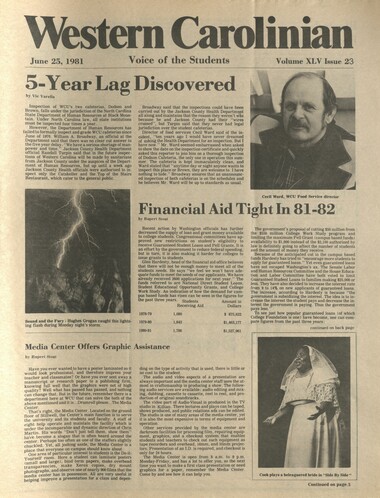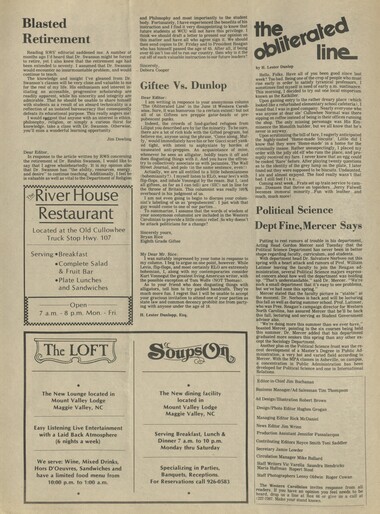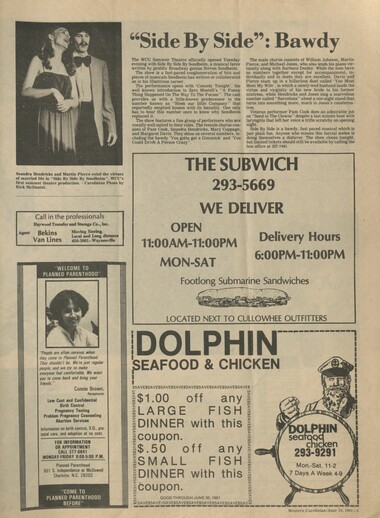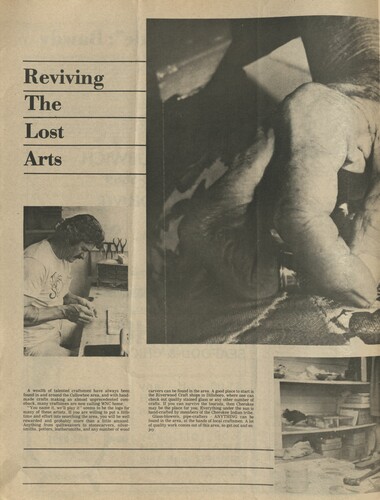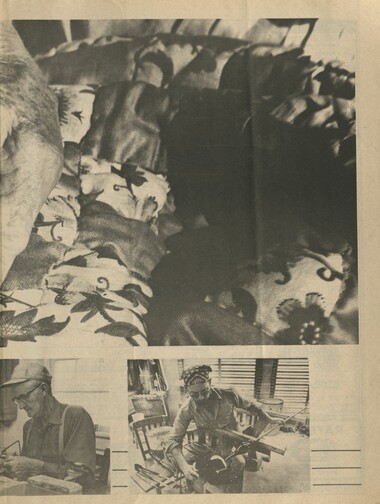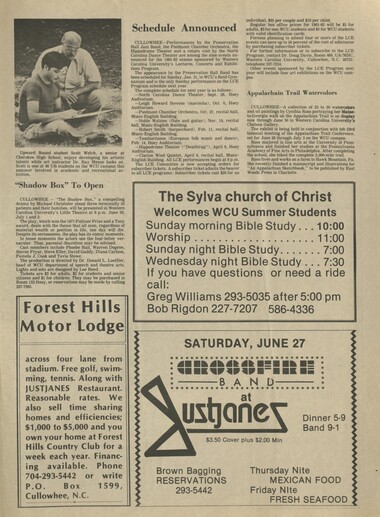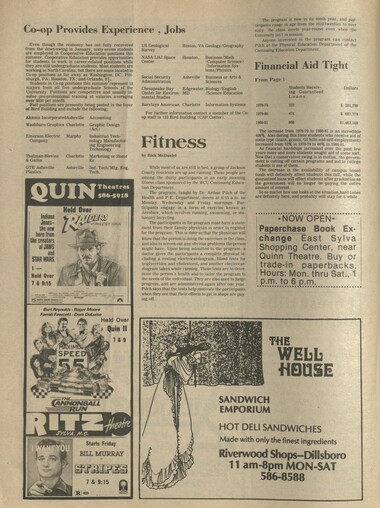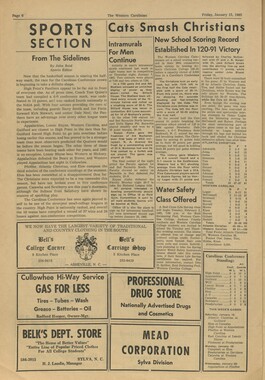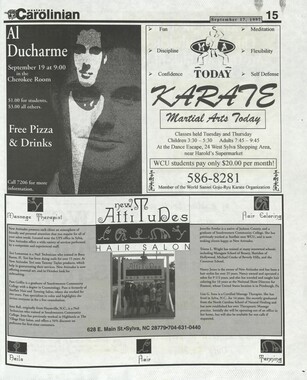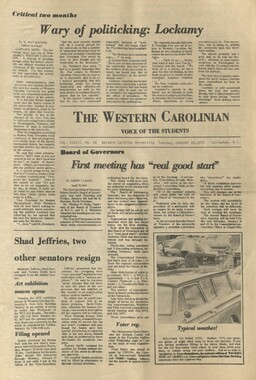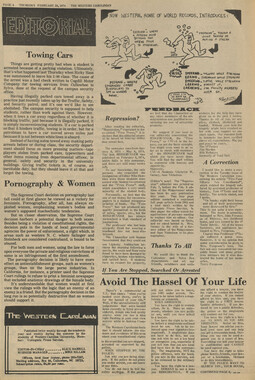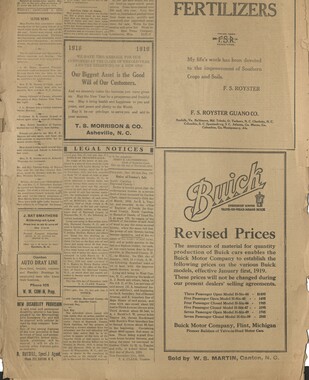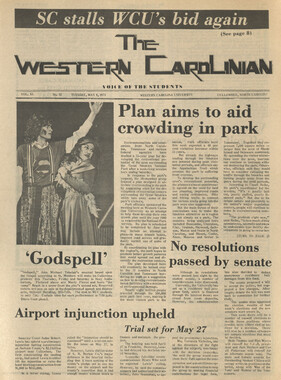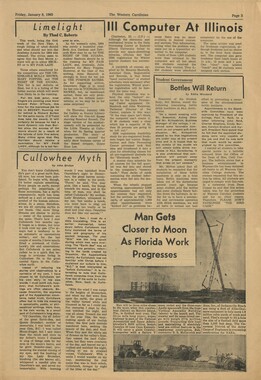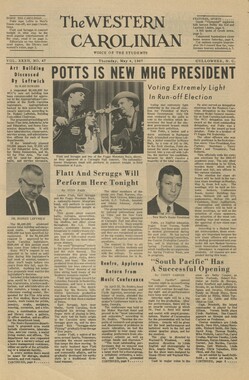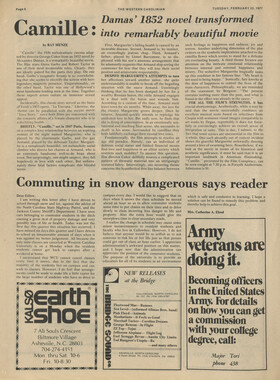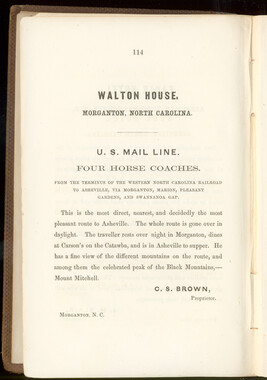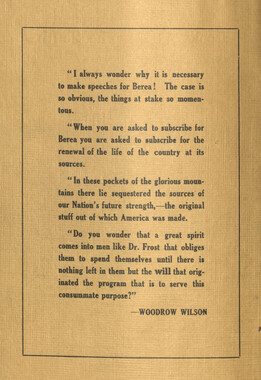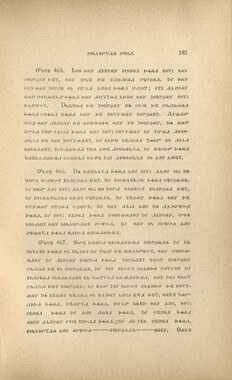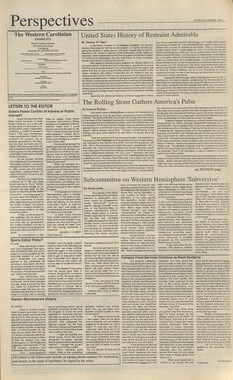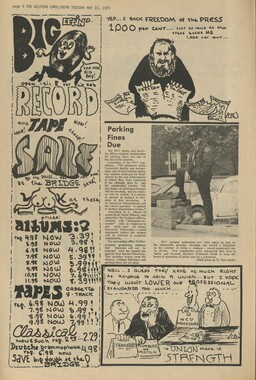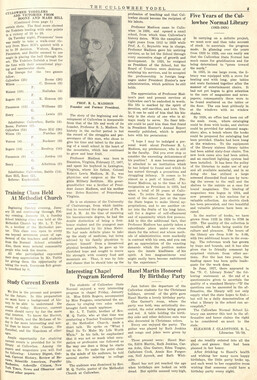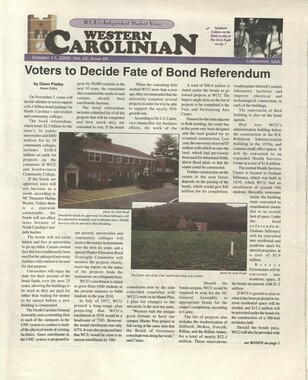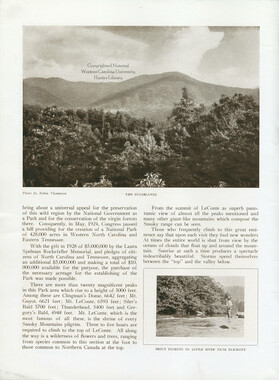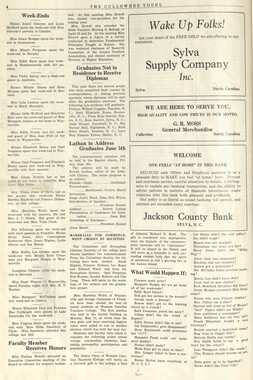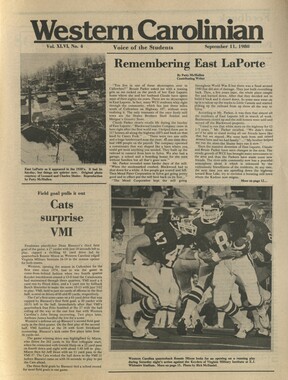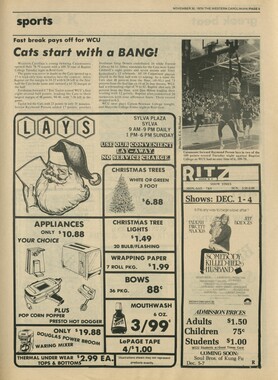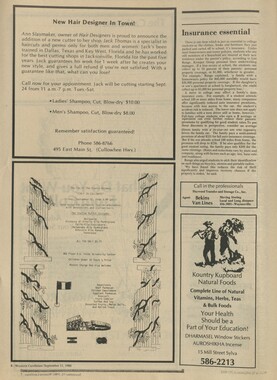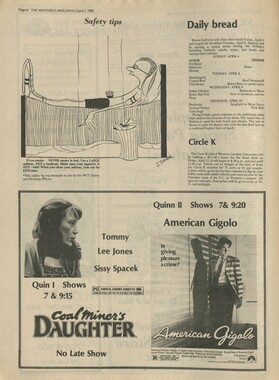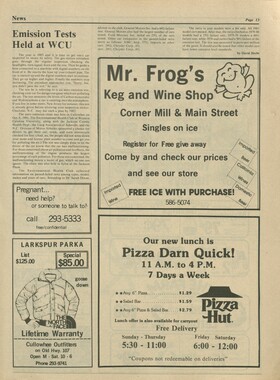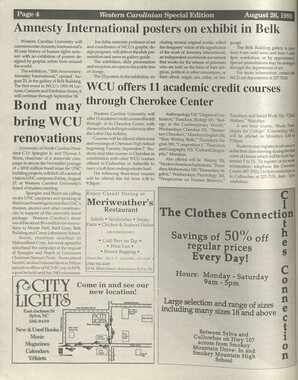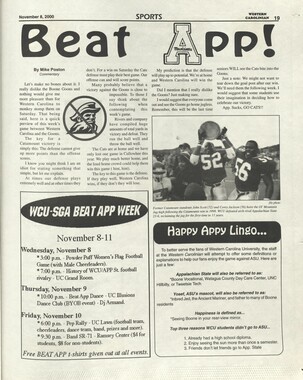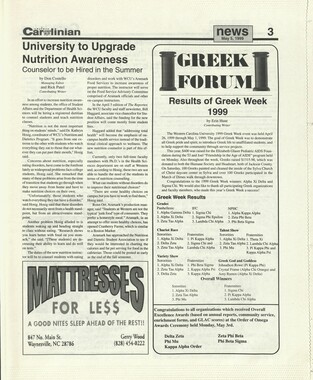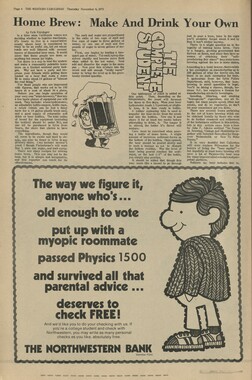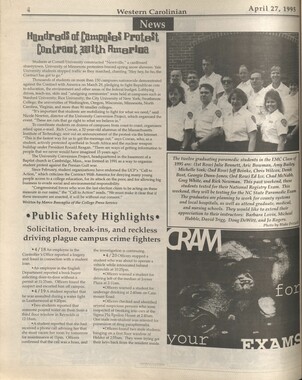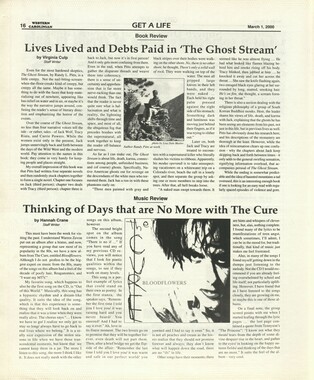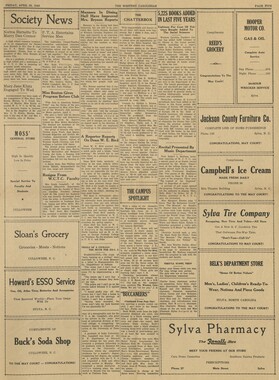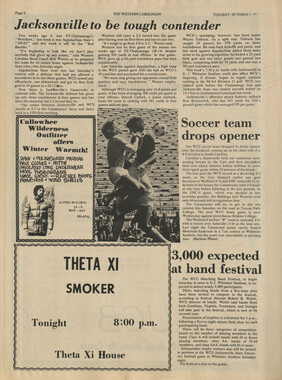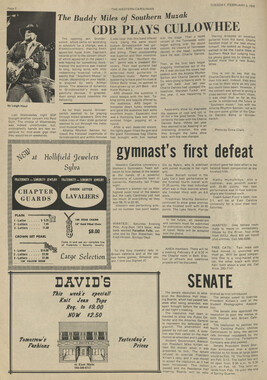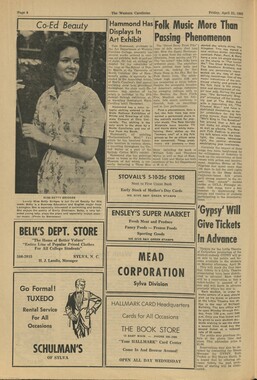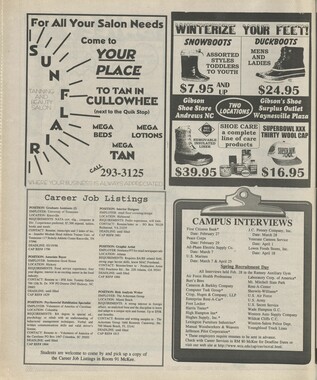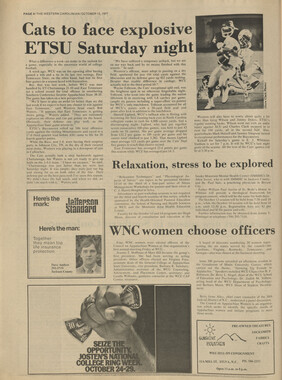Western Carolina University (20)
View all
- Canton Champion Fibre Company (2308)
- Cherokee Traditions (293)
- Civil War in Southern Appalachia (165)
- Craft Revival (1942)
- Great Smoky Mountains - A Park for America (2683)
- Highlights from Western Carolina University (430)
- Horace Kephart (941)
- Journeys Through Jackson (154)
- LGBTQIA+ Archive of Jackson County (15)
- Oral Histories of Western North Carolina (314)
- Picturing Appalachia (6679)
- Stories of Mountain Folk (413)
- Travel Western North Carolina (160)
- Western Carolina University Fine Art Museum Vitreograph Collection (129)
- Western Carolina University Herbarium (92)
- Western Carolina University: Making Memories (708)
- Western Carolina University Publications (2283)
- Western Carolina University Restricted Electronic Theses and Dissertations (146)
- Western North Carolina Regional Maps (71)
- World War II in Southern Appalachia (131)
University of North Carolina Asheville (6)
View all
- Allanstand Cottage Industries (62)
- Appalachian National Park Association (53)
- Bennett, Kelly, 1890-1974 (1295)
- Berry, Walter (76)
- Brasstown Carvers (40)
- Carver, George Washington, 1864?-1943 (26)
- Cathey, Joseph, 1803-1874 (1)
- Champion Fibre Company (233)
- Champion Paper and Fibre Company (297)
- Cherokee Indian Fair Association (16)
- Cherokee Language Program (22)
- Crowe, Amanda (40)
- Edmonston, Thomas Benton, 1842-1907 (7)
- Ensley, A. L. (Abraham Lincoln), 1865-1948 (275)
- Fromer, Irving Rhodes, 1913-1994 (70)
- George Butz (BFS 1907) (46)
- Goodrich, Frances Louisa (120)
- Grant, George Alexander, 1891-1964 (96)
- Heard, Marian Gladys (60)
- Kephart, Calvin, 1883-1969 (15)
- Kephart, Horace, 1862-1931 (313)
- Kephart, Laura, 1862-1954 (39)
- Laney, Gideon Thomas, 1889-1976 (439)
- Masa, George, 1881-1933 (61)
- McElhinney, William Julian, 1896-1953 (44)
- Niggli, Josephina, 1910-1983 (10)
- North Carolina Park Commission (105)
- Osborne, Kezia Stradley (9)
- Owens, Samuel Robert, 1918-1995 (11)
- Penland Weavers and Potters (36)
- Roberts, Vivienne (15)
- Roth, Albert, 1890-1974 (142)
- Schenck, Carl Alwin, 1868-1955 (1)
- Sherrill's Photography Studio (2565)
- Southern Highland Handicraft Guild (127)
- Southern Highlanders, Inc. (71)
- Stalcup, Jesse Bryson (46)
- Stearns, I. K. (213)
- Thompson, James Edward, 1880-1976 (226)
- United States. Indian Arts and Crafts Board (130)
- USFS (683)
- Vance, Zebulon Baird, 1830-1894 (1)
- Weaver, Zebulon, 1872-1948 (58)
- Western Carolina College (230)
- Western Carolina Teachers College (282)
- Western Carolina University (1794)
- Western Carolina University. Mountain Heritage Center (18)
- Whitman, Walt, 1819-1892 (10)
- Wilburn, Hiram Coleman, 1880-1967 (73)
- Williams, Isadora (3)
- Cain, Doreyl Ammons (0)
- Crittenden, Lorraine (0)
- Rhodes, Judy (0)
- Smith, Edward Clark (0)
- Appalachian Region, Southern (2393)
- Asheville (N.C.) (1886)
- Avery County (N.C.) (26)
- Blount County (Tenn.) (147)
- Buncombe County (N.C.) (1664)
- Cherokee County (N.C.) (283)
- Clay County (N.C.) (555)
- Graham County (N.C.) (233)
- Great Smoky Mountains National Park (N.C. and Tenn.) (478)
- Haywood County (N.C.) (3522)
- Henderson County (N.C.) (70)
- Jackson County (N.C.) (4692)
- Knox County (Tenn.) (21)
- Knoxville (Tenn.) (9)
- Lake Santeetlah (N.C.) (10)
- Macon County (N.C.) (420)
- Madison County (N.C.) (211)
- McDowell County (N.C.) (39)
- Mitchell County (N.C.) (132)
- Polk County (N.C.) (35)
- Qualla Boundary (981)
- Rutherford County (N.C.) (76)
- Swain County (N.C.) (2017)
- Transylvania County (N.C.) (247)
- Watauga County (N.C.) (12)
- Waynesville (N.C.) (68)
- Yancey County (N.C.) (72)
- Aerial Photographs (3)
- Aerial Views (60)
- Albums (books) (4)
- Articles (1)
- Artifacts (object Genre) (228)
- Biography (general Genre) (2)
- Cards (information Artifacts) (38)
- Clippings (information Artifacts) (191)
- Crafts (art Genres) (622)
- Depictions (visual Works) (21)
- Design Drawings (1)
- Drawings (visual Works) (184)
- Envelopes (73)
- Facsimiles (reproductions) (1)
- Fiction (general Genre) (4)
- Financial Records (12)
- Fliers (printed Matter) (67)
- Glass Plate Negatives (381)
- Guidebooks (2)
- Internegatives (10)
- Interviews (811)
- Land Surveys (102)
- Letters (correspondence) (1013)
- Manuscripts (documents) (619)
- Maps (documents) (159)
- Memorandums (25)
- Minutes (administrative Records) (59)
- Negatives (photographs) (5651)
- Newsletters (1285)
- Newspapers (2)
- Occupation Currency (1)
- Paintings (visual Works) (1)
- Pen And Ink Drawings (1)
- Periodicals (193)
- Personal Narratives (7)
- Photographs (12982)
- Plans (maps) (1)
- Poetry (5)
- Portraits (1654)
- Postcards (329)
- Programs (documents) (151)
- Publications (documents) (2237)
- Questionnaires (65)
- Scrapbooks (282)
- Sheet Music (1)
- Slides (photographs) (402)
- Sound Recordings (796)
- Specimens (92)
- Speeches (documents) (15)
- Tintypes (photographs) (8)
- Transcripts (322)
- Video Recordings (physical Artifacts) (23)
- Vitreographs (129)
- Text Messages (0)
- A.L. Ensley Collection (275)
- Appalachian Industrial School Records (7)
- Appalachian National Park Association Records (336)
- Axley-Meroney Collection (2)
- Bayard Wootten Photograph Collection (20)
- Bethel Rural Community Organization Collection (7)
- Blumer Collection (5)
- C.W. Slagle Collection (20)
- Canton Area Historical Museum (2110)
- Carlos C. Campbell Collection (198)
- Cataloochee History Project (65)
- Cherokee Studies Collection (4)
- Daisy Dame Photograph Album (5)
- Daniel Boone VI Collection (1)
- Doris Ulmann Photograph Collection (112)
- Elizabeth H. Lasley Collection (1)
- Elizabeth Woolworth Szold Fleharty Collection (4)
- Frank Fry Collection (95)
- George Masa Collection (173)
- Gideon Laney Collection (452)
- Hazel Scarborough Collection (2)
- Hiram C. Wilburn Papers (28)
- Historic Photographs Collection (236)
- Horace Kephart Collection (861)
- Humbard Collection (33)
- Hunter and Weaver Families Collection (1)
- I. D. Blumenthal Collection (4)
- Isadora Williams Collection (4)
- Jesse Bryson Stalcup Collection (47)
- Jim Thompson Collection (224)
- John B. Battle Collection (7)
- John C. Campbell Folk School Records (80)
- John Parris Collection (6)
- Judaculla Rock project (2)
- Kelly Bennett Collection (1314)
- Love Family Papers (11)
- Major Wiley Parris Civil War Letters (3)
- Map Collection (12)
- McFee-Misemer Civil War Letters (34)
- Mountain Heritage Center Collection (4)
- Norburn - Robertson - Thomson Families Collection (44)
- Pauline Hood Collection (7)
- Pre-Guild Collection (2)
- Qualla Arts and Crafts Mutual Collection (12)
- R.A. Romanes Collection (681)
- Rosser H. Taylor Collection (1)
- Samuel Robert Owens Collection (94)
- Sara Madison Collection (144)
- Sherrill Studio Photo Collection (2558)
- Smoky Mountains Hiking Club Collection (616)
- Stories of Mountain Folk - Radio Programs (374)
- The Reporter, Western Carolina University (510)
- Venoy and Elizabeth Reed Collection (16)
- WCU Gender and Sexuality Oral History Project (32)
- WCU Mountain Heritage Center Oral Histories (25)
- WCU Oral History Collection - Mountain People, Mountain Lives (71)
- WCU Students Newspapers Collection (1744)
- Western North Carolina Tomorrow Black Oral History Project (69)
- William Williams Stringfield Collection (2)
- Zebulon Weaver Collection (109)
- African Americans (388)
- Appalachian Trail (32)
- Artisans (521)
- Cherokee art (84)
- Cherokee artists -- North Carolina (10)
- Cherokee language (21)
- Cherokee pottery (101)
- Cherokee women (208)
- Church buildings (166)
- Civilian Conservation Corps (U.S.) (110)
- College student newspapers and periodicals (1830)
- Dams (94)
- Dance (1023)
- Education (222)
- Floods (60)
- Folk music (1015)
- Forced removal, 1813-1903 (2)
- Forest conservation (220)
- Forests and forestry (905)
- Gender nonconformity (4)
- Great Smoky Mountains National Park (N.C. and Tenn.) (154)
- Hunting (38)
- Landscape photography (10)
- Logging (103)
- Maps (84)
- Mines and mineral resources (8)
- North Carolina -- Maps (18)
- Paper industry (38)
- Postcards (255)
- Pottery (135)
- Railroad trains (69)
- Rural electrification -- North Carolina, Western (3)
- School integration -- Southern States (2)
- Segregation -- North Carolina, Western (5)
- Slavery (5)
- Sports (452)
- Storytelling (245)
- Waterfalls -- Great Smoky Mountains (N.C. and Tenn.) (66)
- Weaving -- Appalachian Region, Southern (280)
- Wood-carving -- Appalachian Region, Southern (328)
- World War, 1939-1945 (173)
Western Carolinian Volume 45 (46) Number 23
Item
Item’s are ‘child’ level descriptions to ‘parent’ objects, (e.g. one page of a whole book).
-
-
Western Carolinian June 25, 1981 Voice of the Students Volume XLV Issue 23 5-Year Lag Discovered by Vic Varella Inspection of WCU's two cafeterias, Dodson and Brown, falls under the jurisdiction of the North Carolina State Department of Human Resources at Black Mountain. Under North Carolina law, all state institutions must be inspected four times a year. However, the Department of Human Resources has failed to formally inspect and grade WCU cafeterias since June of 1976. William A. Broadway, an official at the Department said that there was no clear cut answer to the five year delay.- "We have a serious shortage of manpower and time." Jackson County Health Department official Randall Turpin said that in the future inspections of Western Carolina will be made by sanitarians from Jackson County under the auspices of the Department of Human Resources, but up until a week ago Jackson County Health officials were authorized to inspect only the Catskeller and the Top of the Stairs Restaurant, which cater to the general public. Broadway said that the inspections could have been carried out by the Jackson County Health Department all along and maintains that the reason they weren't was because he and Jackson County had their "wires crossed", but Turpin said that they never had legal jurisdiction oyer the student cafeterias. Director of food services Cecil Ward said of the incident, "ten years ago I would have never dreamed of asking the Health Department for an inspection. But I have now." Mr. Ward seemed embarrassed when asked to show the date on the inspection certificate and quickly asked this reporter to join him on a thorough inspection of Dodson Cafeteria, the only one in operation this summer. The cafeteria is kept immaculately clean, and Ward stated that "anytime day or night anyone wants to inspect this place or Brown, they are welcome to. I have nothing to hide." Broadway assures that an unannounced inspection of both cafeterias is on the schedules and he believes Mr. Ward will be up to standards as usual. Cecil Ward, WCU Food Service director Financial Aid Tight In 81-82 by Rupert Stout Recent action by Washington officials has further decreased the supply of loan and grant money available to college students. Congressional committees have approved new restrictions on student's eligibility to receive Guaranteed Student Loans and Pell Grants. It is an effort by the government to reduce federal spending, but in turn, it is also making it harder for colleges to issue grants to students. Glen Hardesty, head of the financial aid office believes that there will not be enough money to meet all of the students needs. He says "we feel we won't have adequate funds to meet the needs of our applicants. We have already received 2600 applications for next year." The funds referred to are National Direct Student Loans, Student Educational Opportunity Grants, and College Work Study. An indication of how the demand for campus based funds has risen can be seen in the figures for the past three years, students Amount in Receiving Aid Dollars Sound and the Fury - Hughes Grogan caught this lightning flash during Monday night's storm. Media Center Offers Graphic Assistance 1978-79 1,080 $ 875,622 1979-80 1,643 $1,463,177 1980-81 1,786 $1,527,961 The government's proposal of cutting $50 million from the $550 million College Work Study program and limiting the maximum Pell Grant (campus based funds) availability to $1,800 instead of the $2,100 authorized by law is definitely going to affect the number of students and the amount of money they receive. Because of the anticipated cut in the campus based funds Hardesty has tried to "encourage more students to apply for guaranteed loans." Yet even guaranteed loans have not escaped Washington's ax. The Senate Labor and Human Resources Committee and the House Education and Labor Committee have both voted to limit Guaranteed Student Loans to families making $25,000 or less. They have also decided to increase the interest rate from 9 to 14% on new applicants of guaranteed loans. The increase, according to Hardesty is because "the government is subsidizing the interest. The idea is to increase the interest the student pays and decrease the interest the government is paying. Thus the government pays less." To see just how popular guaranteed loans (of which College Foundation is one) have become, one can compare figures from the past three years: continued on back page by Rupert Slout Have you ever wanted to have a poster laminated so it would look professional, and therefore impress your teacher and classmates? Or have you ever sent away a manuscript or research paper to a publishing firm, knowing full well that the graphics were not of high quality? Well what has passed has passed, and nothing can change that. But in the future, remember there is a department here at WCU that can solve the both of the above mentioned and it is...Drumroll please...The Media Center. That^s right, the Media Center. Located on the ground floor of Stillwell, the Center's main function is to serve the university and its students and faculty. A staff of eight help operate and maintain the facility which is under the incomparable and dynamic direction of Chris Martin. His words "Don't just tell them, show them" ha've become a slogan that is often heard around the center. Perhaps too often as one of the staffers slightly chuckled. Yet, all joshing aside, the Media Center is a nlace that everyone on campus should know about. One area of particular interest to students is the Do-it- Yourself room. Here a student can laminate posters (small and large), bind term papers, make overhead transparencies, make Xerox copies, dry mount nhotographs, and observe one of nearly 900 films that the media center has in possession. All are very useful in helping improve a presentation for a class and depen ding on the type of activity that is used, there is little or ho cost to the student. The audio and video aspects of a presentation are always important and the media center staff uses the utmost in craftsmanship in producing a show. The following audio services are available: audio editing and mixing, dubbing, cassette to cassette, reel to reel, and production of original soundtracks. The video part of Audio-Visual is produced in the TV studio in Killian. There lectures and plays can be taped, shows produced, and public relations ads can be edited. The studio is one of many areas of the media center, yet it is also the most expensive in terms of equipment and operation. Other services provided by the media center are darkroom facilities for processing film, repairing equipment, graphics, and a checkout system that enables students and teachers to check out such equipment as tape recorders and overhead, 16mm, and 35mm projectors. Presentation of an I.D. is required, and checkout is only for 24 hours. The Media Center is open from 8 a.m. to 9 p.m. Monday-Friday, and has a lot to offer you, so the next time you want to make a first class presentation or need graphics for a paper, remember the Media Center. Come by and see how it can help you. Continued on page 3
Object
Object’s are ‘parent’ level descriptions to ‘children’ items, (e.g. a book with pages).
-
The Western Carolinian is Western Carolina University's student-run newspaper. The paper was published as the Cullowhee Yodel from 1924 to 1931 before changing its name to The Western Carolinian in 1933.
-
